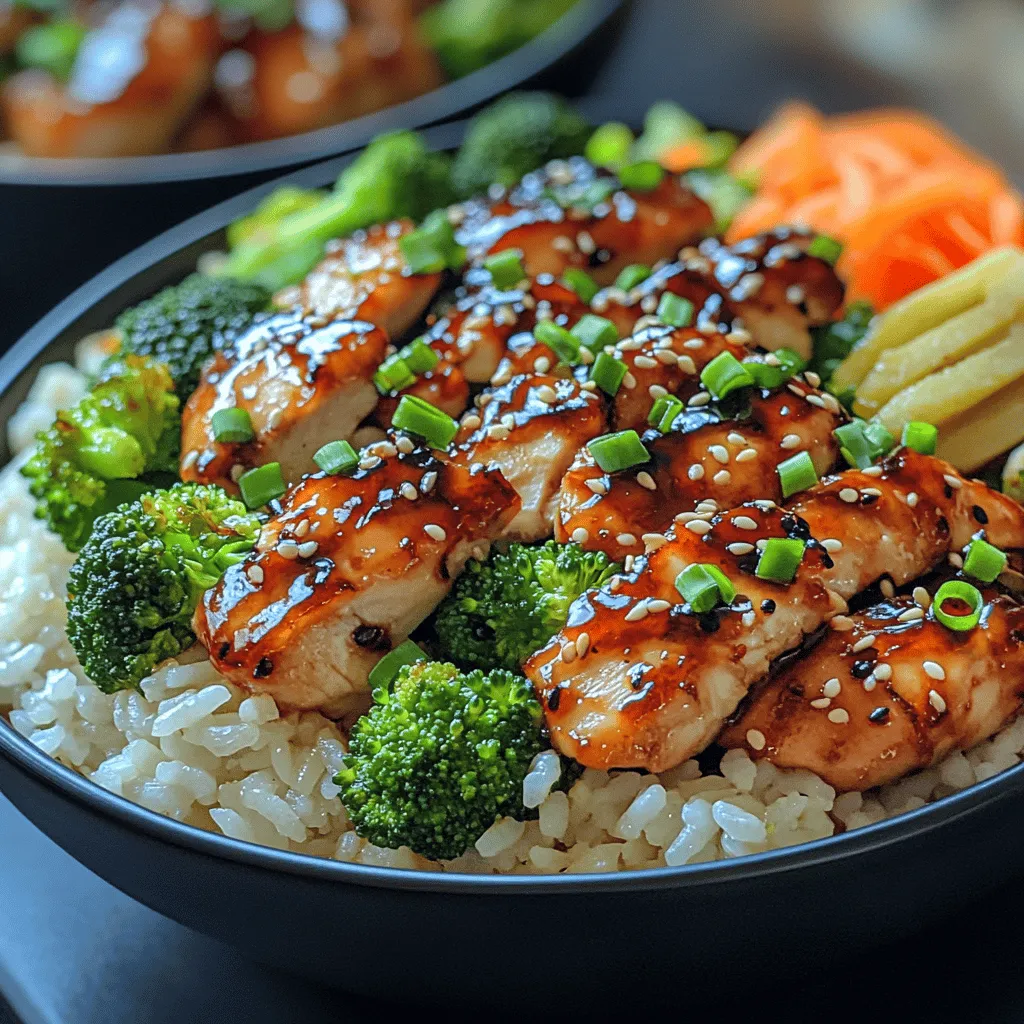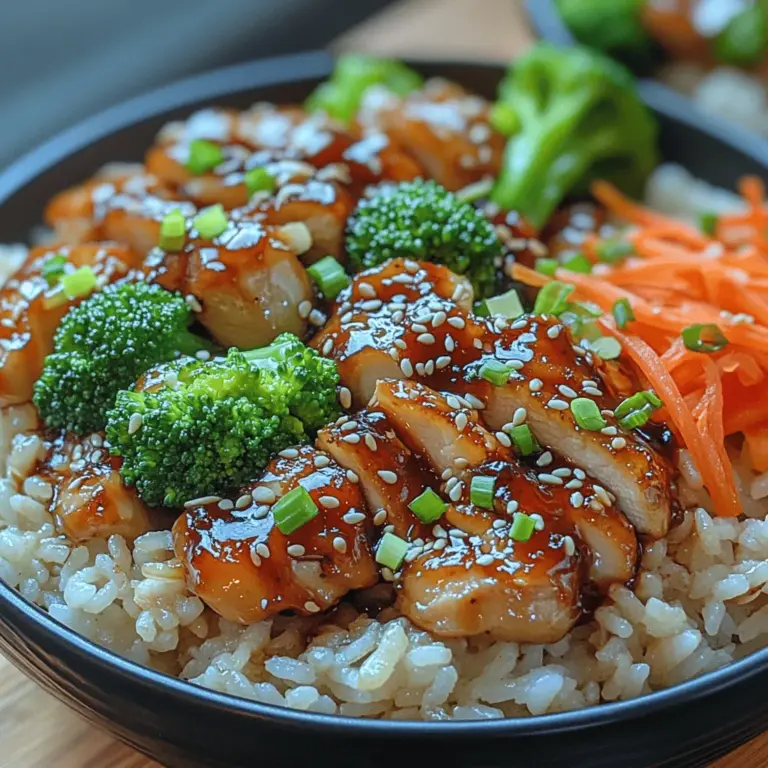Introduction
Understanding the joy of a well-prepared meal is essential for any home cook. When the day’s hustle and bustle leaves you craving a comforting yet nutritious dish, the Teriyaki Delight Chicken Rice Bowls emerge as a stellar choice. This recipe embodies a harmonious blend of savory flavors and wholesome ingredients, making it an ideal option for a weeknight dinner or a meal prep delight that you can savor throughout the week. Imagine tender chicken marinated in a homemade teriyaki sauce, served over fluffy jasmine rice, and accompanied by vibrant vegetables that add both color and nutrition to your plate. In this article, we will guide you through the process of creating these delicious bowls, ensuring that each step is clear and easy to follow, allowing you to impress your family and friends with your culinary skills.
The Allure of Teriyaki Chicken
Exploring the Origins of Teriyaki
Teriyaki, a term that translates to “grilled or broiled” in Japanese, has deep historical roots in Japanese cuisine. The cooking style dates back to the Edo period (1603-1868), where the combination of grilling proteins and glazing them with a savory-sweet sauce became popular among Japanese households. Traditionally, teriyaki was prepared with fish, particularly mackerel, before evolving to include various meats, such as chicken, beef, and pork.
The teriyaki sauce itself is a unique concoction, made primarily from soy sauce, sake, and mirin. This sauce not only enhances the flavor of the dish but also reflects the Japanese philosophy of balancing tastes—sweet, salty, and umami. The cultural significance of teriyaki chicken in Japan has made it a beloved dish that has transcended borders, becoming popular in various parts of the world. Today, teriyaki chicken is a staple in Japanese restaurants and home kitchens alike, admired for its simplicity and flavor.
Why Teriyaki Chicken is a Favorite
The appeal of teriyaki chicken lies in its rich flavor profile and versatility. The sweet and savory notes of the teriyaki sauce create a mouthwatering glaze that complements the juicy chicken perfectly. This dish can be easily adapted to suit different dietary preferences, making it a favorite among many. Whether you are a meat lover, a health-conscious eater, or someone who enjoys plant-based alternatives, teriyaki chicken can be tailored to meet your needs.
For those looking for a protein-packed meal, chicken thighs are often preferred for their moist texture and robust flavor. On the other hand, vegetarians can substitute the chicken with tofu or tempeh, allowing everyone to enjoy the delicious essence of teriyaki. Additionally, the vibrant vegetables that accompany the rice bowl not only enhance the visual appeal but also contribute essential nutrients, ensuring that your meal is both satisfying and wholesome.
Ingredients Overview
Essential Ingredients for Teriyaki Delight Chicken
To create the Teriyaki Delight Chicken Rice Bowls, it is crucial to select high-quality ingredients that will elevate the dish. Let’s take a closer look at the key components that make this recipe shine.
Chicken Thighs: Chicken thighs are the star of this dish, known for their tender, juicy texture and rich flavor. They contain more fat than chicken breasts, which keeps the meat moist during cooking. This attribute makes them an excellent choice for grilling or sautéing, especially when coated in a flavorful sauce like teriyaki. Additionally, chicken thighs are often more budget-friendly than other cuts, making them a practical option for home cooks.
Soy Sauce: A fundamental element in the teriyaki sauce, soy sauce contributes depth and umami to the dish. It’s important to choose a quality soy sauce, preferably one that is naturally brewed and low in sodium, to avoid overwhelming the flavors of the other ingredients.
Breaking Down the Teriyaki Sauce Ingredients
The teriyaki sauce is the heart of this recipe, and understanding its components can help you appreciate the dish even more.
Mirin: A sweet rice wine used commonly in Japanese cooking, mirin adds a distinct sweetness and complexity to the teriyaki sauce. Its syrupy consistency helps the sauce cling to the chicken, creating that signature glaze.
Sake: Another traditional Japanese rice wine, sake enhances the overall flavor of the teriyaki sauce. It adds a subtle depth and a hint of acidity that balances the sweetness of mirin.
Ginger and Garlic: Fresh ginger and garlic are essential aromatics that elevate the teriyaki sauce’s flavor. Ginger adds a zesty warmth, while garlic imparts a savory richness that rounds out the sauce beautifully. Together, these ingredients create a well-balanced flavor profile that enhances the chicken and the entire dish.
Rice and Vegetable Pairings
The choice of rice and vegetables can significantly impact the overall texture and nutrition of your Teriyaki Delight Chicken Rice Bowls.
Jasmine Rice: For this recipe, jasmine rice is the ideal choice due to its fragrant aroma and slightly sticky texture. The fluffy grains of jasmine rice absorb the teriyaki sauce well, allowing each bite to be infused with flavor. If jasmine rice is unavailable, you can substitute it with basmati rice or even brown rice for a healthier option.
Vegetables: Broccoli and carrots are excellent companions for teriyaki chicken. Broccoli is rich in vitamins C and K, while carrots provide beta-carotene, an antioxidant that promotes eye health. These vegetables not only offer a pop of color but also add crunch and nutritional value to the dish. You can also experiment with other vegetables such as bell peppers, snap peas, or bok choy to suit your taste preferences.
Step-by-Step Preparation
Now that we have a solid understanding of the ingredients, let’s dive into the preparation process that will bring your Teriyaki Delight Chicken Rice Bowls to life.
Preparing the Chicken
The first step in crafting your teriyaki chicken is to prepare the chicken thighs properly. Start by patting the chicken dry with paper towels. This step is crucial as it removes excess moisture, allowing for a better sear and a perfect golden-brown crust.
Next, season the chicken thighs with a pinch of salt and pepper. This simple seasoning enhances the chicken’s natural flavors and prepares it to absorb the delicious teriyaki sauce. Once seasoned, you can marinate the chicken in a portion of the prepared teriyaki sauce for at least 30 minutes or up to overnight in the refrigerator. Marinating not only infuses the chicken with flavor but also tenderizes the meat, resulting in a juicier final product.
Crafting the Teriyaki Sauce
While the chicken is marinating, it’s time to prepare the teriyaki sauce. In a small saucepan, combine soy sauce, mirin, sake, minced ginger, and minced garlic. Heat the mixture over medium heat until it begins to simmer, stirring occasionally to combine the flavors. To thicken the sauce, you can mix a teaspoon of cornstarch with a tablespoon of water to create a slurry. Gradually add this slurry to the simmering sauce, stirring continuously until it reaches your desired consistency. This step will ensure that your teriyaki sauce has a rich, glossy texture that adheres beautifully to the chicken.
With the chicken marinated and the teriyaki sauce crafted, you are well on your way to creating a delicious and satisfying meal. Stay tuned for the next section, where we will delve into cooking the chicken, preparing the rice, and assembling your Teriyaki Delight Chicken Rice Bowls into a delightful presentation.

Techniques for Balancing Flavors in the Sauce
Creating a well-balanced teriyaki sauce is key to the success of your Teriyaki Delight Chicken Rice Bowls. Achieving the perfect harmony between sweet, salty, and umami flavors can elevate your dish significantly. Here are some essential techniques to consider:
1. Sweetness: Start with a base of soy sauce and then add a sweetener. Brown sugar or honey works well, but you can also experiment with maple syrup or agave nectar for a different flavor profile. Adjust the amount based on your personal preference; a little sweetness can help to balance out the saltiness of the soy sauce.
2. Saltiness: Soy sauce provides the essential salty element, but it’s important to choose a variety that suits your taste. Low-sodium soy sauce is a great option if you want to control the saltiness. You can also add a splash of fish sauce or oyster sauce for a deeper umami flavor.
3. Acidity: To enhance the flavor profile, consider adding a splash of rice vinegar or sesame oil. The acidity will help cut through the sweetness and saltiness, making the sauce more balanced and complex. Start with a small amount and adjust to taste.
4. Umami: Incorporate ingredients like garlic, ginger, and sesame seeds to introduce that essential umami flavor. Freshly grated ginger and minced garlic can add depth and richness to the sauce, enhancing the overall taste.
How to Ensure the Sauce Achieves the Desired Thickness
The thickness of your teriyaki sauce is crucial for coating the chicken and creating that appealing glaze. Here are some tips to achieve the perfect consistency:
1. Cornstarch Slurry: Mixing cornstarch with cold water to create a slurry is a foolproof way to thicken your sauce. Once your sauce is simmering, gradually stir in the slurry, allowing it to cook for a few minutes until it thickens. This method ensures a smooth texture without clumping.
2. Simmering: If you prefer a more concentrated flavor, simmer your sauce over low heat for a longer period. This method evaporates excess moisture, intensifying the flavors while thickening the sauce naturally. Just keep an eye on it to prevent burning.
3. Additions for Thickness: Some cooks prefer to add pureed fruits such as pineapple or applesauce to enhance flavor and thickness. These additions not only contribute to the sauce’s consistency but also add a unique twist to the traditional recipe.
Combining Chicken and Sauce
Once your sauce is perfected, the next step is to combine it with the chicken. Here are best practices for ensuring an even coating and maximum flavor absorption:
Best Practices for Coating the Chicken Evenly
1. Marination: Allow the chicken to marinate in the teriyaki sauce for at least 30 minutes, or overnight for optimal flavor. This step not only infuses the chicken with flavor but also helps tenderize the meat.
2. Cooking Method: Whether you grill, pan-fry, or bake your chicken, ensure the cooking surface is hot before adding the chicken. This technique creates a sear that locks in moisture and flavor.
3. Basting: During cooking, periodically baste the chicken with additional teriyaki sauce. This not only enhances the flavor but also helps develop a beautiful glaze on the chicken.
Timing for Maximum Flavor Absorption
Timing is critical for achieving maximum flavor absorption. As a general rule:
1. Marination Time: At least 30 minutes is essential; however, longer marinating times yield better results. If using chicken thighs, consider marinating them for up to 4 hours for enhanced flavor.
2. Cooking Time: Ensure that the chicken is cooked thoroughly but not overdone. Chicken breasts typically require about 6-8 minutes per side, while thighs may take a bit longer. Use a meat thermometer to ensure the internal temperature reaches 165°F for safe consumption.
Assembling the Rice Bowls
Now that your chicken is perfectly cooked and coated in sauce, it’s time to assemble your Teriyaki Delight Chicken Rice Bowls. Presentation is key, so consider these layering techniques for both visual appeal and flavor integration:
Layering Techniques for Visual Appeal and Flavor Integration
1. Base Layer: Start with a generous scoop of cooked rice (white or brown) as your base. The rice will absorb some of the sauce, enhancing its flavor.
2. Chicken Placement: Slice the teriyaki chicken into bite-sized pieces and arrange it artfully atop the rice. Overlapping slices can create visual interest and ensure every bite has a piece of chicken.
3. Vegetable Layer: Add a layer of sautéed or steamed vegetables for color and texture. Broccoli, bell peppers, and carrots not only add nutrition but also vibrant colors that make the dish more appealing.
4. Finishing Touches: Drizzle a bit more teriyaki sauce over the entire bowl for a glossy finish.
Suggestions for Garnishes to Elevate Presentation
1. Sesame Seeds: Sprinkle toasted sesame seeds on top for a nutty flavor and crunchy texture.
2. Green Onions: Finely chop green onions and use them as a bright garnish that adds freshness.
3. Nori Strips: For an authentic touch, add strips of nori (seaweed) to the top of your bowl.
4. Pickled Ginger: Serve pickled ginger on the side for a zesty contrast to the rich teriyaki flavor.
Serving Suggestions
Ideal Serving Temperature and Presentation
To ensure your Teriyaki Delight Chicken Rice Bowls are enjoyed at their best, serve them hot. Here are some tips for optimal presentation:
1. Warm Bowls: Pre-warm your serving bowls by rinsing them with hot water. This keeps your dish warm longer, enhancing the dining experience.
2. Layering: As discussed, layering is essential for an attractive presentation. Consider using transparent bowls to showcase the colorful layers.
3. Serving Style: For a buffet-style meal, consider serving the components separately, allowing guests to customize their bowls.
Creative Ideas for Customizing Serving Experiences
1. DIY Rice Bowl Bar: Set up a rice bowl bar with various toppings and sauces, allowing guests to create their own combinations.
2. Theme Nights: Pair your teriyaki chicken with other Asian-inspired dishes, such as spring rolls or dumplings, to create a themed dinner night.
Pairing Options
To enhance your meal, consider these pairing options for side dishes and beverages:
Suggested Side Dishes and Beverages That Complement the Meal
1. Side Dishes: Consider serving your rice bowls with miso soup or a light cucumber salad dressed in rice vinegar for a refreshing contrast.
2. Beverages: Pair with a light, crisp beverage such as green tea or a Japanese beer (like Asahi or Sapporo) for an authentic experience. For something non-alcoholic, try sparkling water with a splash of lime.
Exploring Variations with Different Proteins or Vegetables
The versatility of this dish allows for many variations:
1. Proteins: Swap out chicken for beef, tofu, or shrimp depending on your dietary preferences. Each protein will absorb the teriyaki sauce differently, providing unique flavor profiles.
2. Vegetables: Experiment with seasonal vegetables like snap peas, bok choy, or zucchini to keep your dish fresh and exciting.
Nutritional Insights
Understanding the nutritional profile of your Teriyaki Delight Chicken Rice Bowls can help you make informed choices about your meal.
Nutritional Breakdown of the Dish
1. Caloric Content: A typical serving of Teriyaki Delight Chicken Rice Bowls contains approximately 600-700 calories, depending on the portion size and specific ingredients used.
2. Macronutrient Analysis: Each serving generally includes around 30 grams of protein, 80 grams of carbohydrates, and 15 grams of fat, making it a balanced meal option.
3. Health Benefits of Each Ingredient: Chicken provides lean protein, while rice offers energy-boosting carbohydrates. Vegetables add vitamins, minerals, and fiber, contributing to overall health.
Dietary Considerations
1. Gluten-Free Modifications: For gluten-free options, substitute soy sauce with tamari or coconut aminos, ensuring the dish remains delicious without gluten.
2. Suggestions for Vegan Adaptations: Replace chicken with tofu or tempeh and use maple syrup in the sauce for a vegan-friendly version. Additionally, ensure all other ingredients, like rice, are vegan-compliant.
Conclusion
The Teriyaki Delight Chicken Rice Bowls not only provide a satisfying meal but also bring a taste of Japanese cuisine into your home kitchen. With their balance of flavors, textures, and nutritional benefits, they are a delightful addition to any meal rotation. By following this guide, you can easily recreate this dish, ensuring a flavorful experience that will please everyone at the table. Enjoy the process of cooking and savor the delicious results! Whether you are serving it for a casual weeknight dinner or a special gathering, these rice bowls are sure to impress.

